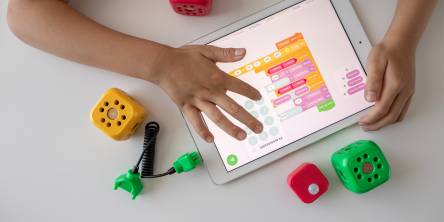Artificial Intelligence - The Future of Smart Phones

Smartphones are evolving. The constant rapidity in their growth has never failed to amaze us. Mobile phones have now become something more than just being a device to call or kill the boredom and dullness. This is all because they have become intelligent machines due to AI.
Artificial intelligence, a.k.a. machine intelligence is the development of computer applications that can process information, and respond in a way which is closer to human reasoning. You can even call this process of making computers ‘think’ for themselves.
Artificial Intelligence on phones has become the de facto must-have feature – whether consumers know it or not.
Gone are the days when artificial intelligence was a fantasy in movies. This tech has enabled the emotional capacity to interact with humans. Many of us are already taking advantage of it through mobile apps. Owing to this thousand of new ‘smart’ apps and devices are being launched every day. As this smartphone revolution is poised to go onto the next level—with "superphones" let us see what all these smart pieces of slabs have to offer us. Here are some ways that prove smartphones actually stand true to their name when fused with the magic of AI.
Brainy Photos and Filter Apps

Google Photos is available by default in many Android Smartphones. It uses AI and machine learning to identify human faces in a photo. It is this ability to understand the content in a photo which makes Google Photos better than an ordinary photo storage app. Users can also make it easier for users to find images they want quickly. Apps such as Prisma and Artisto use AI to apply filters and convert an ordinary photo into a beautiful work of art.
Chatting Made Fun

Google’s Allo also employs AI and language processing tools to understand how a user converses over the messenger with friends. It focuses more on the context and content of a conversation so that it can come up with smart suggestions and more accurate answers. The more time you spend on the messenger, more are the chances of getting accurate results.
Typing made Easy
Oh! Typing on touchscreen phones was always been an uncomfortable experience as compared to a proper keyboard. Microsoft’s SwiftKey takes it a step further by using AI. It helps you understand what message is written and accordingly provide accurate text predictions and the auto correction options. This is where predictive text input helps users overcome the limitations of small keys and keyboards.
Making Smartphones Actually Smart
It is again the AI Assistant that has made Google’s Pixel and Pixel XL smartphones a unique device. Like the AI in the Allo, it creates a virtual image of a user based on his queries, commands and browser history, so it can understand the context in query better and provide more appropriate suggestions. HTC has deployed a similar AI tool called Sense Companion in the HTC U Ultra and U Play smartphones that works in similar lines as Google Assistant.
AI in smartphones is still at a very nascent stage but the immense potential of Artificial Intelligence is sure to change all. Looking at the pace with which AI is increasing it won't be absurd to say that in future every personal and official task of the human being will be handled by the Smartphones.
All thanks to this brilliant technology in the mobile phones that we quickly and easily shop online, or book the hotels and restaurants or a flight. So, imagine friends, when the nascent stage of Artificial Intelligence can do this much, the future is sure to bring something very colossal, for sure.
Similar Articles
Mobiles and by extension, mobile apps are the basis for the modern mobile device and take it beyond a mere communication tool. In today’s world, information has to be available at our fingertips and people want mobile applications to do instantly what websites used to do before, give information and details instantly, anytime & anywhere
In the ever-evolving landscape of app development, embracing innovation is not just a choice but a necessity. Enter serverless architecture, a transformative paradigm reshaping how we approach app development.
EdTech developers leverage modern technology to create immersive and engaging learning apps. A successful product relies on solid technology, including front-end frameworks like React.js, offering efficient development and incorporating cutting-edge features like gamification and voice recognition for a standout user experience in the education industry
Internet of Things, or IoT, is a fast-growing concept that promises a transformation in how we live and work. It enables us to connect and control smart devices such as wearables, medical devices, sensors & more using mobile apps. IoT has impacted many aspects of our lives, and some of the most notable are home building, logistics, healthcare, and more.
Mobile app development has become an essential part of the digital ecosystem as mobile devices have become more prevalent than desktops or laptops. Regarding mobile app development, two popular approaches are Xamarin and native mobile app development.
With React Native becoming one of the preferred tools for developing mobile and web apps, there has been a growing focus on outsourcing software development based on this language
With over 6.3 billion estimated smartphone users worldwide, mobile app usage is growing exponentially. Studies have shown that Americans check their phones 262 times daily, once every 5.5 minutes! People check their phones at home, at work, on the street, while eating, in bed, and cars.
With the number of companies embracing digital solutions growing continuously, there is also an increasing demand for cloud services. Cloud development services help businesses (small or big) take advantage of digital transformation and to move their infrastructures to the cloud.
Businesses nowadays are fully enmeshed in the outstaffing and outsourcing trend. In order to boost production and take advantage of the expertise of specialized experts, it is safe to assume that modern professionals are more reliant on outsourcing









